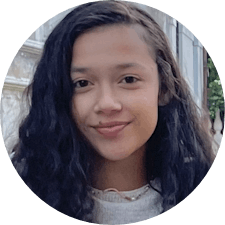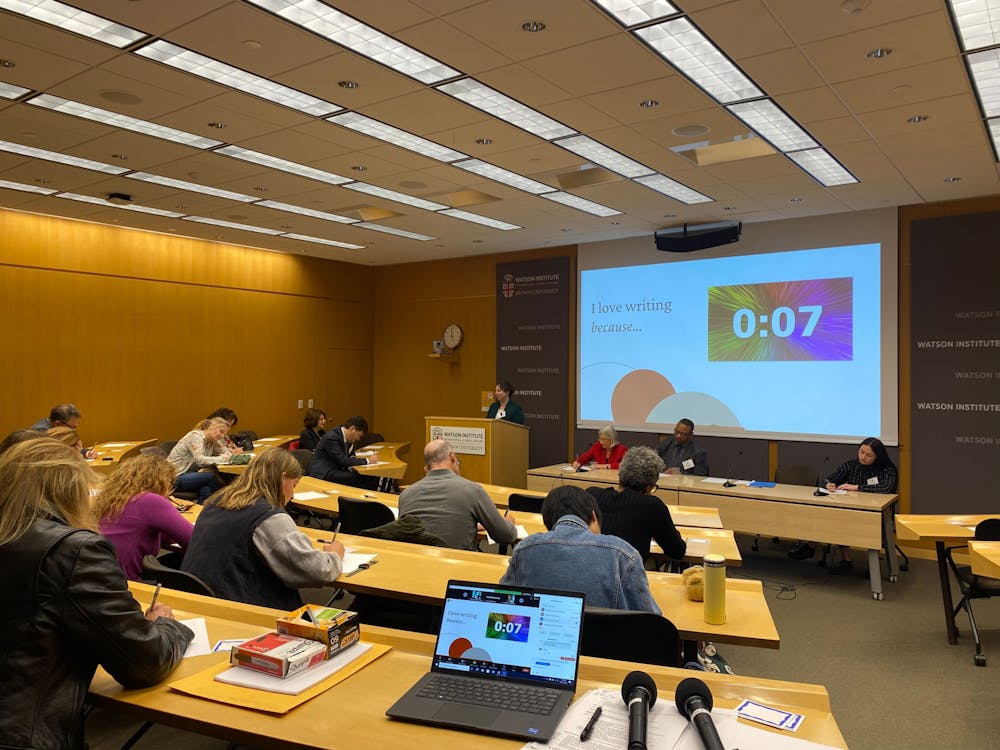Former and current students and faculty came together to celebrate the 40th anniversary of the Writing Fellows Program in the Watson Institute for International Affairs Wednesday. The event featured a panel of writing fellow leaders past and present who discussed the role the program played during and after their time at the University.
The panel consisted of Tori Haring-Smith, the founder of the Writing Fellows Program and a former professor of English and theatre arts and performance studies; Austin Jackson, assistant professor of the practice in the Nonfiction Writing Program, who previously directed the Writing Fellows Program; Senior Associate Director for Writing and English Language Support Jenna Morton-Aiken, who now runs the program; and Tierra Sherlock ’24, a current writing fellow and writing center ambassador.
The Writing Fellows Program, which gives students the opportunity to revise their writing with peer tutors, was the first of its kind at its inception in 1982.
The ‘origin story’
According to Haring-Smith, she began the Writing Fellows Program as an assistant professor at the University after she was asked to “fix the writing problem” at Brown. Assuming that faculty and graduate students wouldn’t have the capacity for the task, Haring-Smith looked to undergrads.
She asked faculty members to nominate students who “write well” and “would not stomp on other people, would be supportive and would look at writing as a process and not something to be corrected.”
“The principles behind the program are simple,” Haring-Smith said. “You do not need to have content knowledge in order to be able to help somebody with writing … and doing so as a layperson is more beneficial than (as) an English teacher.”
These founding principles are still present today, said Lucy McInerney GS, a current writing associate for the Writing Center and proctor for the Writing Fellows Program, in an interview with The Herald.
According to McInerney, the Writing Fellows Program has three main goals: to train “fellowees” — the students whose writing is under revision — to write about their discipline in a way that is understandable to people new to the field, to train fellows to understand and edit writing about subjects they’re unfamiliar with and to help faculty become better at providing “helpful, supportive and collaborative feedback.”
Writing as a ‘community-oriented process’
The mission behind the Writing Fellows Program is to “make revision more accessible,” Sherlock said in an interview with The Herald. “It’s about promoting the idea that good writing doesn’t mean writing a perfect first draft, it means that any good final draft has to go through rounds of feedback and revision.”
The fellows are introduced to the program through ENGL 1190M: “The Teaching and Practice of Writing: Writing Fellows Program,” after which they are divided into different cohorts assigned to various courses, Sherlock explained.
“Then, our head fellow will meet with the professor who teaches that class, establish all of the expectations and act as a go-between between us and the professor.”
According to Sherlock, fellows are assigned to “anywhere between four and seven” students in the class, who are required to review their essays with the fellows before submitting them.
Sherlock herself was assigned a fellow when she was a first-year and appreciated having that support system. “People sometimes treat writing like a solitary practice, but it can be really intimidating and hard to write by yourself,” she said.
“I really think of writing now as a community-oriented process,” she added during the panel discussion.
Sherlock emphasized in her interview that the fellows work with classes across all levels and concentrations. “It totally varies — you're fellowing anyone between freshmen and seniors.”
“That's supposed to promote this nonhierarchical structure,” she added. “We’re all students.”
‘Radical’ for its time
The class “introduces students to the pedagogy surrounding teaching writing,” McInerney said, adding that students spend the first few weeks “talking about what it means to be in a peer environment versus that top-down relationship you have with a professor when it comes to writing.”
“When you are in meetings with fellowees, you don’t want to harm their relationship with writing in any way,” Sherlock said. “And a lot of times people’s identities are going to directly impact their writing, whether that’s your race, your class or however you've been taught what is ‘proper’ academic writing — because a lot of the time ‘proper’ writing just refers to white, upper-class writing.”
Attendees of the panel noted that the program discussed these issues since its beginning. Senior Lecturer in Economics Brad Gibbs ’93 remembered learning about “power and privilege and diversity” when he was a fellow — a piece of the curriculum Haring-Smith credited to the early cohorts of fellows.
The structure of the program alone “was radical” to Sarah Mayper ’87. At other universities with writing centers, “students were either forced to go or went because they thought or knew that they were failing as writers,” she added. At Brown, fellows are assigned to classes, meaning the program doesn’t make any assumptions about a fellowee’s ability, Mayper said.
“What felt radical … was the empowerment aspect,” added Mara Lozier Shore ’89 P’23 P’24. “Undergraduates were empowered to listen without judgment to other undergraduates, writers were empowered to be free to screw up.”
“Some empowerment … came straight from you, Tori. You welcomed us into your home,” Lozier Shore said, referencing how Haring-Smith would often invite fellows to her house on George Street.
Allison Kelsey ’88 recalled “coming over for Thanksgiving because I couldn’t afford to go home.”
“This was a grown-up in a position of authority, who empowered us to be part of your life in a really open, free way,” Lozier Shore added. “Arriving at Brown and ending up as a writing fellow and empowering other peers to tap into their writing power felt transformative, felt radical and felt incredibly free. And I've carried that with me.”
“I have never forgotten the things you taught me,” Mayper told Haring-Smith. “That’s why I created a mini writing fellows program in my first three years of being an upstart teacher in Attleboro High School.”
According to Sherlock, this notion of empowerment remains at Brown today.
“It’s a really incredible experience to be able to sit down with someone and know that you actually have value and you have skill sets that you can share with them,” she said at the panel.

Katie Jain is a University News editor from New Jersey overseeing the graduate student life beat. She is a senior concentrating in International and Public Affairs and History.





